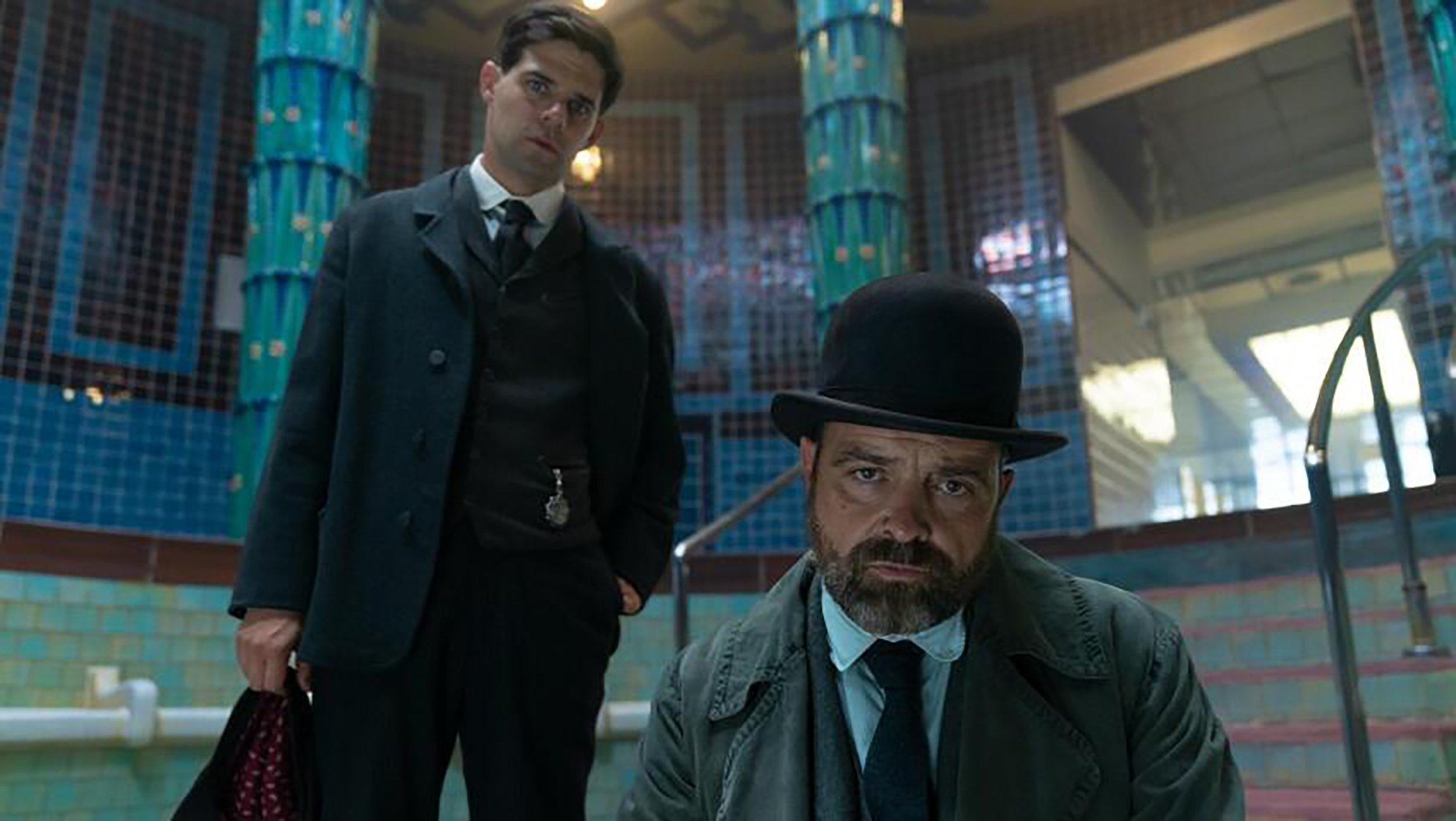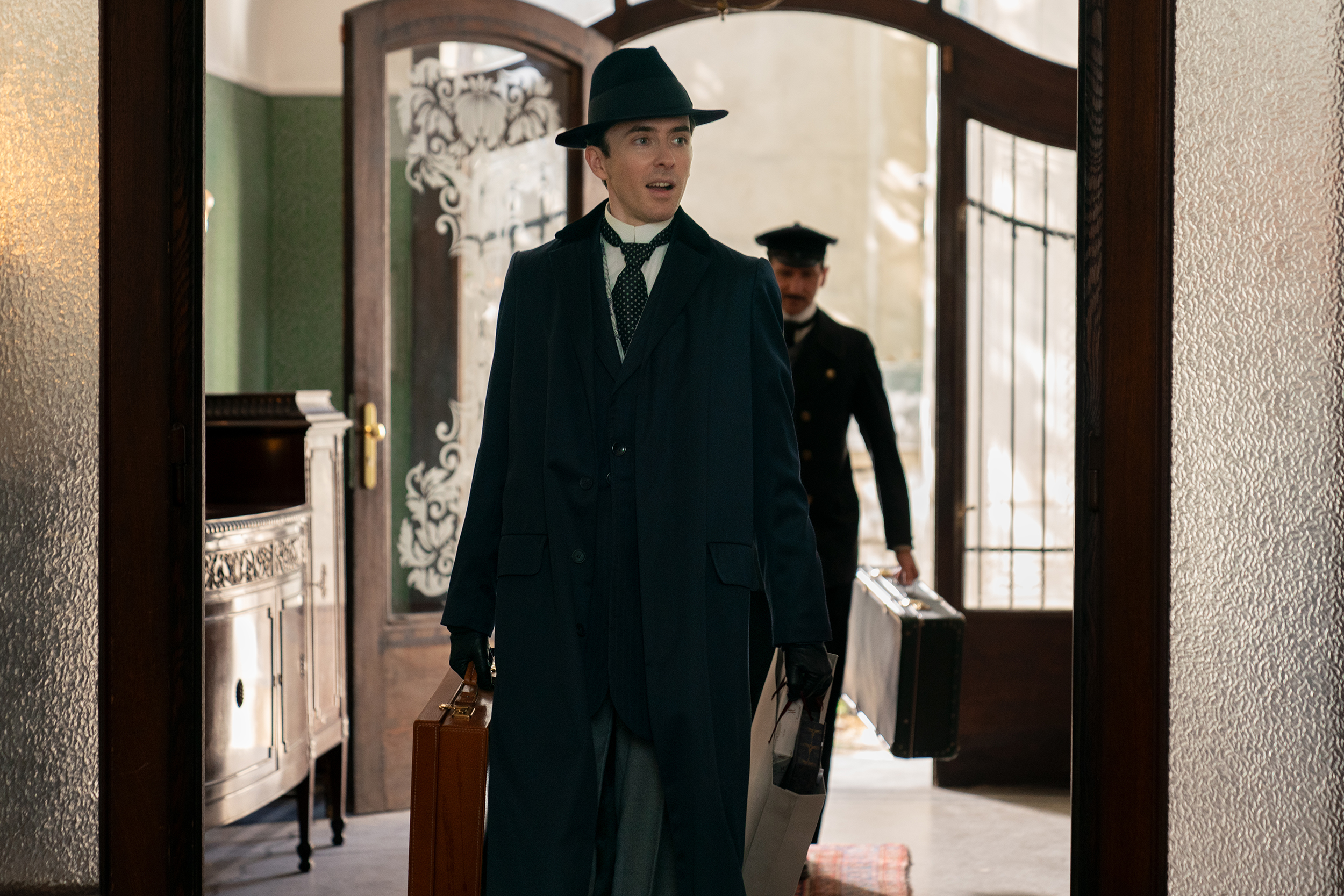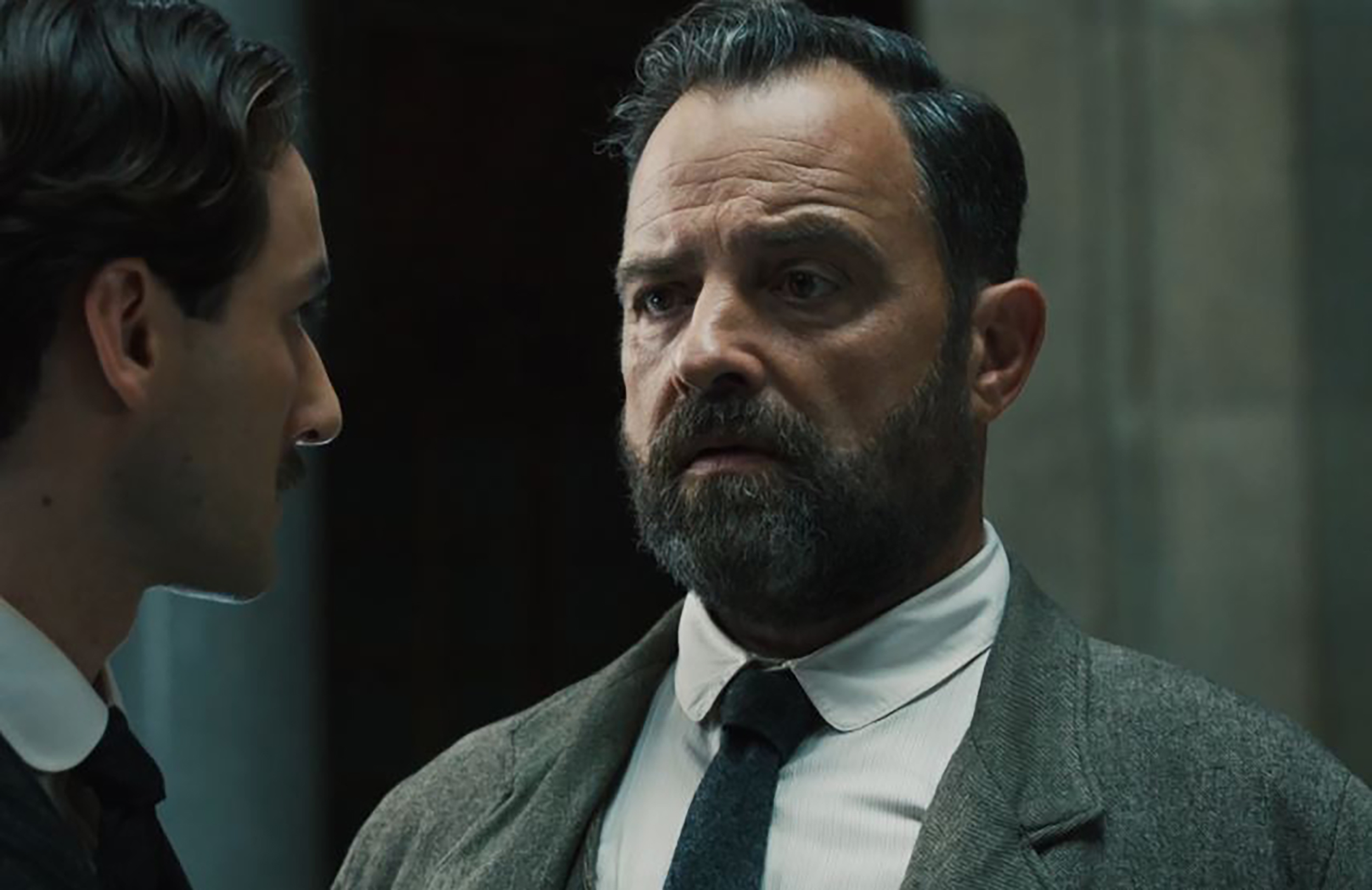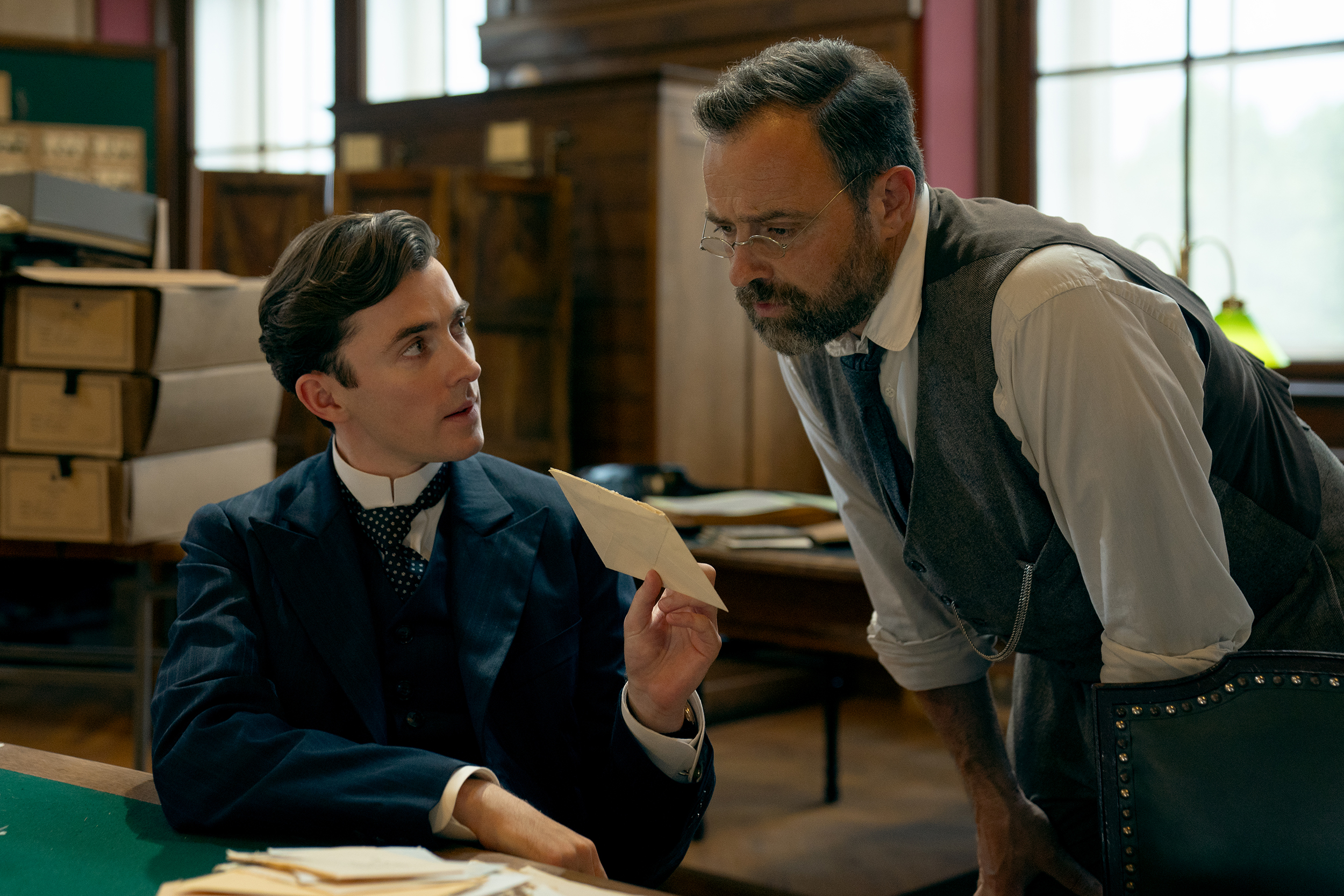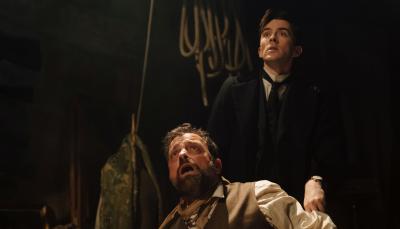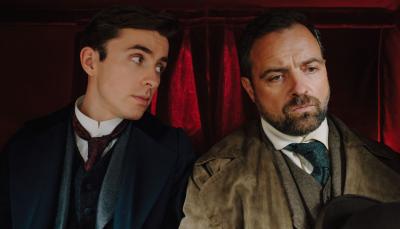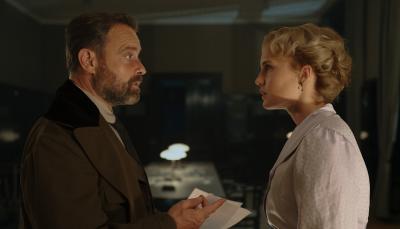'Vienna Blood' Returns for One More Dance in "Mephisto Waltz"
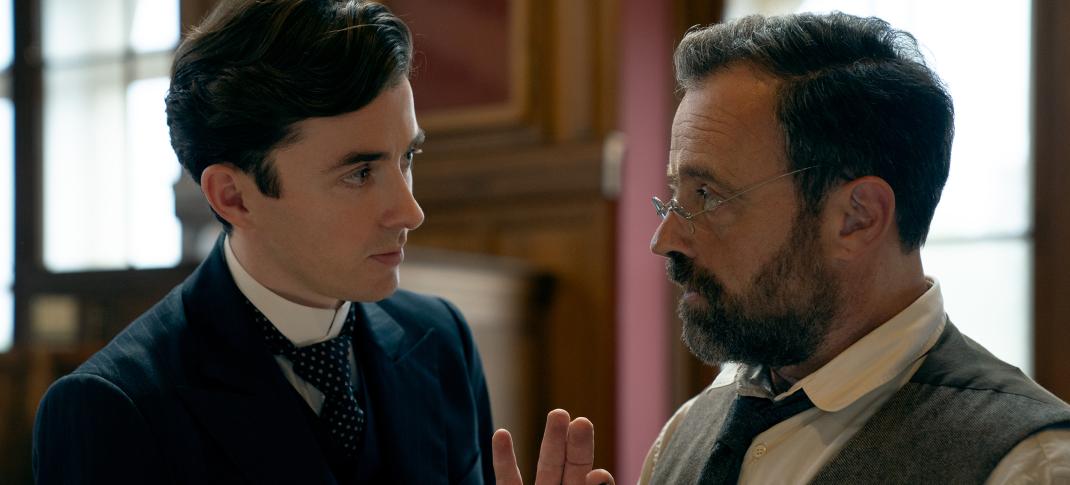
Matthew Beard as Max and Juergen Maurer as Oskar in 'Vienna Blood' Season 4
Petro Domenigg © 2024 Endor Productions / MR Film
Vienna Blood is back for one more waltz! The British-Austrian production is unlike most English-language shows on PBS’s slate, thanks to its setting in mainland Europe between the Victorian and Great War periods. In some respects, it’s a classic odd couple-solves-murders show featuring an energetic, overly self-assured guy (young British neurologist Max Liebermann, Matthew Beard) and a more fatalist veteran who continues to harbor idealistic hopes of true justice being possible (Inspector Oskar Rheinhardt, Juergen Maurer). As is often the case in series like this, the second tier of characters contribute significantly to each episode’s texture and tone; here, it’s Max’s doting parents and sister who provide levity and the outsider’s reasonable perspective that solving murders all day and night is perhaps not the best career choice for maintaining one’s mental health and long-term relationships.
We open in 1909 with Max’s thoughts on gambling as an expression of guilt – on some level, the gambler knows that they will eventually lose, which will be a form of punishment for whatever wrongs the gambler has inflicted on others. Let’s file that away for a bit and pop over to the Leopoldstadt police precinct, where Police Commissioner von Bülow is enjoying a moment of peak self-importance as only an underqualified martinet can when taking all of the credit for an accomplishment that was a group effort. The “monstrous reign” of one of Vienna’s most notorious criminals, an arms dealer named Burgsteller, has ended with his capture. The once-invulnerable gun seller enters the cells as a humbled man in shackles, his grimy hair askew and suit rumpled, looking like he has a terrible sunburn despite the autumnal cloud cover.
Oskar can’t wait to testify against Burgsteller at trial, and with his conviction all but assured, the usually relatively upright inspector is gloating at the notion of so many criminals throughout the city wanting Burgsteller dead lest he turn state’s evidence against them.
Having little to lose, Burgsteller offers the choicest intel imaginable, the identity and whereabouts of a shadowy figure who goes by Mephisto, but only to National Intelligence Chief Strasser and only in person. Oskar half-expects his visit to Strasser will be a fool’s errand, but Strasser surprises him by agreeing to the meeting and furnishing some helpful exposition for us. The former police commissioner has been hunting for Mephisto for years, as whoever it is has been manipulating events throughout the empire and selling state secrets but scarcely leaving detectable traces behind.
Strasser personally signs an order putting Burgsteller in Oskar’s hands for the purpose of bringing him to a crumbling castle ruin at Strasser’s estate for their meeting and tells Oskar he can bring two trustworthy men with him in case anything goes sideways. The little high-stakes outing goes sideways almost as soon as they arrive at the impressively moody location, which features high winds making everyone’s coats flap around, kicking up dust*.
(*I half-expected a tumbleweed to drift by and a few measures of an Ennio Morricone spaghetti western score to play in the background.)
It’s good Oskar brought Detective Haussman and new-to-us Detective Meier because as soon as Burgsteller and Strasser start negotiating what protection or reduced sentence considerations Burgsteller might extract in exchange for his unique information, shots ring out. Everyone retreats to small niches in the brickwork, but Burgsteller panics and bolts, with Strasser following close behind, leading to each of them being shot immediately at point-blank range by a masked gunman. Detective Meier kills the gunman in turn, as Oskar agrees to Strasser’s dying request that he find Mephisto.
Back at the police precinct, the killings are, of course, a hideous scandal – a career-ender for Oskar, if von Bülow has anything to say about it – but at least Strasser’s deputy, who steps into the late Intelligence Director’s shoes, seems to be a pretty decent guy who correctly perceives that Oskar is twice the detective of anyone else (“we both know the Commissioner relies on you” had me howling. More of this guy, please!) and asks Oskar to report any progress or developments directly to him.
It seems that the shooter wasn’t a major Viennese underworld player himself, just a guy in a street gang hoping to avoid getting charged based on any testimony from Burgsteller, but that seems fishy to Oskar. He returns to the scene of the crime, finding two cigarette butts where the gunman had been hiding, and tucking them into a little matchbox for further study. Strasser’s grieving daughter tells Oskar she believes her father’s death was inevitable given how doggedly he worked on his cases, something we get an intense glimpse of when she reveals the classic red string conspiracy board taking up a wall in Strasser’s office.
Why was he so obsessed with the attempted bombing of diplomatic negotiations a few years ago between Austria and Russia in Luxembourg? The bomber, Serbian nationalist Lazar Kiss, died in a fire a few months after Oskar and Max foiled the plot, so it was a closed case. Fraulein Strasser says her father was obsessed with “disasters of policing” and that she recalled him repeating while drunk one night, “Someone in Vienna is giving away our secrets.” So Mephisto isn’t just a shadowy puppetmaster in the Viennese underworld, but the empire’s worst enemy!
Back at the precinct, Oskar begins to assemble his investigative team. Archivist Fraulein Linder (Miriam Hie) is on the case, bringing him all of the files she could find related to the Luxembourg bombing attempt, and agrees to dig further into the provenance of the cigarette butts he retrieved at Strasser estate. Next, he needs Max. Fortunately, Max has just arrived back in Vienna, triumphant following a tour of the United States, where our forebears were keen to embrace his Freudian-influenced work on criminality. We’ve always loved our true crime, haven’t we?
Max’s arrival home is met with loving delight from Mendel (Conleth Hill) and Rachel (Amelia Bullmore) and more wry affection from Leah (Charlene McKenna). He knows his role and submits to all of the hugs and kisses they want to lavish on their boy, who fake-complains of a sore jaw from all of his speaking engagements and confirms Mendel’s eagle-eyed assessment that he’s sporting one of the latest looks from New York. The Liebermann parents are thrilled to hear of his successful mingling among New York society, a moment enhanced by thoughts of Bullmore’s influential role as the Dowager Duchess of Tintagel in the new adaptation of The Buccaneers.
(I could also go for a Vienna Blood x Gilded Age crossover event soon. Julian Fellowes, Steve Thompson, call me!)
Oskar appears just as Max acknowledges he’ll have to live at home for at least the next month, as his apartment is still being sublet. His arrival prompts a classic dry, yet glib, “Oh, dear, has someone died?” from Max. The two quickly move on to the kind of post-dinner drinks I think of as Exposition Scotch, catching each other up on their respective career developments. Max has been promoted to the Head of the Neurology Department at his hospital (they had to after Dr. Neumann disappointed everyone by turning out to have been a murderer last season). Oskar assumes his detective work days are gone for good, but he’s hoping Max will help him with the Mephisto case. These sabotaged covert diplomatic missions required top-level Austrian government connections to pull off, and he needs Max’s perspective on the type of mind that could develop and exploit those connections.
An interview with Burgsteller’s lover yields two tidbits: his friendship with the popular Spanish singer Carlos Carillo and their joint enterprise at The Palace. Predictably, Carillo denies knowing Burgsteller and having ever given a performance for the royal family at the Imperial Palace. The connection between Burgsteller and Mephisto doesn’t get any clearer until Haussman makes sure that the file on Carillo’s suspicious sudden death at a local bathhouse lands on Oskar’s desk. Meier brings Carillo’s personal effects to Oskar and Max, and it’s a melancholy jumble of things: a coat check claim ticket, a fancy gambling chip, a massive wad of cash, many bundled letters from admirers, and…a cipher text decoder?
A nicely done time-lapse sequence of Fraulein Linder, Max, Haussman, and Oskar going through Carillo’s letters to find one encoded for this specific cipher culminates in Max noticing one with an unusual stamp. The letter is unopened and postmarked from Vienna, even though it’s an expensive bit of postage – the same as Max’s parents used to send him letters in New York. Wait, what’s this? Max gently pulls the stamp from the envelope, revealing a cipher-ready code under it! Being like a dog with a bone pays off sometimes. The encoded message, “Riegers, August 22”, sparks a flash of memory for Oskar – Riegers Palace is a very schmancy casino. The casino plus the unusual gambling chip suggests The Palace is a rendezvous point for Mephisto’s network. Now we’re getting somewhere!
Max loves undercover work and convinces Oskar to go to The Palace together, as an English lord and Austrian nobleman, respectively. Fancy togs won’t be a problem, as Max is fashionable, and Oskar can borrow clothes from Mendel. They will need cash to make the deception believable... If only Oskar knew someone who’d just returned to Vienna from a lucrative lecture tour! Max wants to say the thing, but Oskar points out that it’s his turn to say it.
Welcome to the case, Doctor.
These Are A Few Of My Favorite Things (From This Episode):
- Max’s gift to Oskar from his trip to the States is a little sterling silver box engraved with his initials for his coffee beans. Aw!
- The bathhouse where Carillo met his unfortunate end is such a cool building. The tiling, in particular, is gorgeous; anyone familiar with the building, please let us know what it is and if it’s still in use.
- Hey, Ladies, Part 1: We’ll get into this in more detail next week, but Oskar’s unexpected interaction with Therese – collecting her husband from his night in the drunk tank – promises something. Heartache for sure, but maybe not full-on heartbreak? This scene is 100 proof of mutual pining and repressed longing.
- Hey, Ladies, Part 2: New York City is full of lovely, well-to-do young Jewish women, but it seems Max couldn’t resist looking homeward, having sent Clara Weiss not one but two postcards from his trip. He tells his mother to stop fishing for more information, saying only that “we’re friends again,” which is very nice but gives me pause on Clara’s behalf. The last we saw of her and Max, she called in his debts to her, which was delightful. Is she going to tolerate another attempt at romance from him, though?
Vienna Blood Season 4 continues on most PBS stations, the PBS app, and the PBS Masterpiece Prime Video Channel at 10 p.m. ET on Sundays through the end of January. All four episodes are available for members to watch as a binge (or as initially intended, i.e., two two-hour-long episodes) on PBS Passport. As always, check your local listings and streamers.

